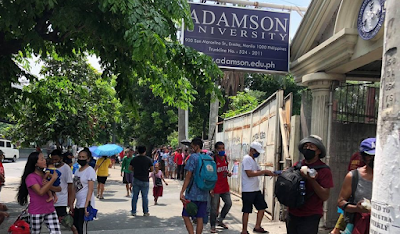In Photo: Hot Meals Charity Program for the poor by Adamson University
The COVID-19 pandemic tests the moral compass of the owners and administrators of Catholic colleges and universities. Amid dwindling enrollment, would their faith in divine providence move them to preserve jobs and maintain the wages and benefits of school employees?
Catholic universities and colleges in the Philippines are known to offer quality education. Three out of 4 top universities in the Philippines are Catholic schools (Ateneo, De La Salle, UST). Centuries-old religious orders and congregations own and manage some of these institutions. In general, the Catholic Church views Catholic schools as places where the love of Christ is felt and experienced. Thus, it is not enough for them to advance knowledge, dole out qualifications, and ensure that human resource in this country remains globally competitive.
In his 2019 address to the members of the International Federation of Catholic Universities, Pope Francis challenged Catholic higher educational institutions not only to have “a conscience, but also an intellectual and moral strength whose responsibility goes beyond the person to be educated and extends to the needs of all humanity.” This is the reason why some Catholic schools from the beginning of the pandemic searched and opened their campuses to shelter and feed the frontliners and the homeless. Preaching could never be more eloquent than compassion.
Catholic school administrations do not need to search for the poor outside their campuses, because the people in need could be their employees. As the saying goes, the best way to preach compassion is to practice charity at home. However, there’s the rub – wage cuts, forced leaves and retrenchments of employees, including denigration of job security, may be more convenient options in dealing with revenue losses arising from decrease in enrollment.
One may argue that it is unfair to demand more from Catholic higher educational institutions more than what the labor code provides. They are not charitable institutions and should be treated like ordinary business enterprises. Thus, in the time of pandemic they should be given more leniency and understanding. But I need to point out that these institutions are non-profit, non-stock, and tax-free. From a more mundane accounting perspective, I argue that these universities and colleges admittedly will suffer losses due to decrease in enrollment. The loss in the first 6 months and the projected loss, however, can be mitigated by resumption of tuition revenue inflows when classes resume. Further, financial resources such as accumulated savings or fund balances could immediately cover all losses incurred.
A certain loss for a limited period can hardly damage their resource capacity. Many of these institutions have accumulated liquid assets over years and decades of academic operations that it will be farthest from reality that they will suffer financial distress or go bankrupt short of retrenching or retiring employees. Parenthetically, some of these Catholic religious institutions have been in the business of education even during colonial times as early as 4 centuries ago.
Rene Luis Tadle|Rappler.com
Source: Peso Economics


No comments:
Post a Comment